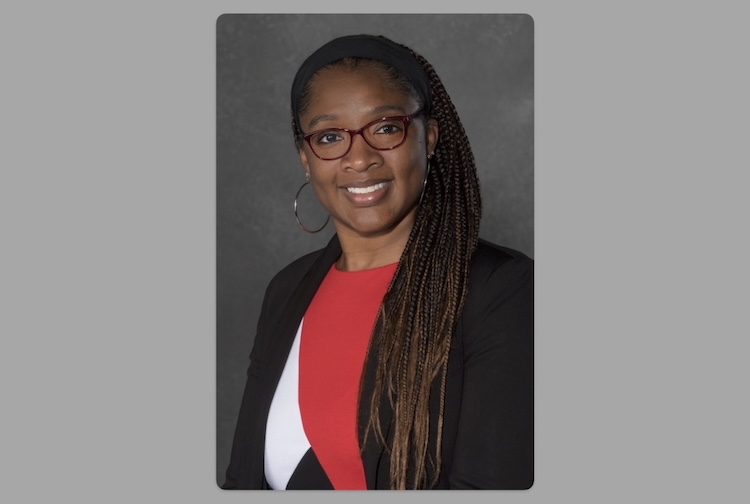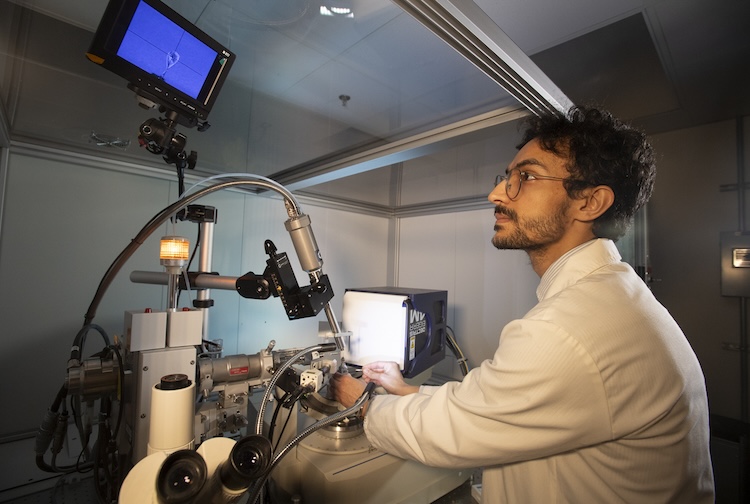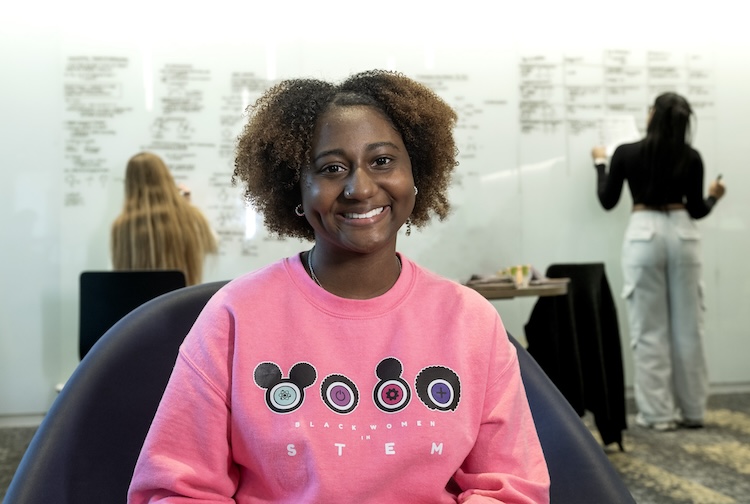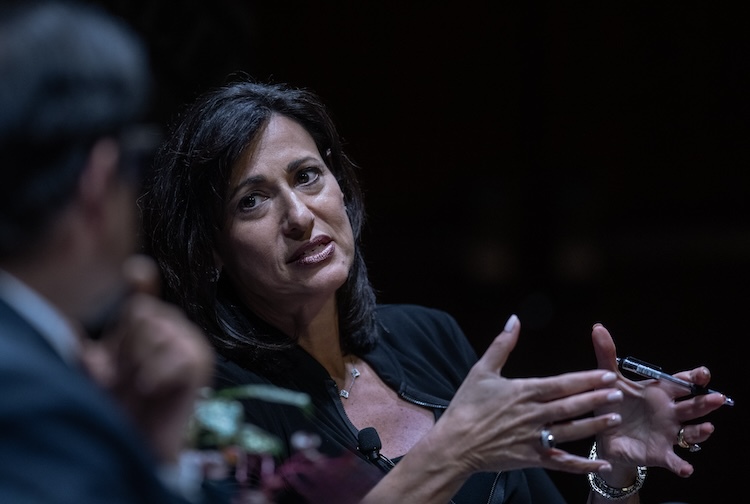
Thoughtful mentors, tough questions: Arnethea Sutton’s journey to a career in health disparities research
VCU Health Pauley Heart Center researcher shares her passion for unlocking answers and improving patient outcomes.
January 04, 2024 Arnethea Sutton, Ph.D., became interested in research through her experiences at Virginia Commonwealth University. (VCU Enterprise Marketing and Communications)
Arnethea Sutton, Ph.D., became interested in research through her experiences at Virginia Commonwealth University. (VCU Enterprise Marketing and Communications)
By Konrad Solberg and Liz Torrey
Pursuing a career as a researcher — a researcher who is working to understand why Black women with breast cancer experience poorer outcomes from treatments—wasn’t originally part of the plan for Arnethea Sutton when she set foot on Virginia Commonwealth University’s Monroe Park campus as a first-year undergraduate student more than 20 years ago.
“I originally came to VCU to go to pharmacy school,” Sutton said. “I shadowed with a pharmacist for one day and realized: this is not for me. It didn’t jibe with my personality.”
As an undergraduate, Sutton got to know a medical technologist through her work-study program at VCU, and that colleague introduced her to the university’s degree program in clinical laboratory sciences. She then decided to take advantage of VCU’s accelerated bachelor’s-to-master’s degree tracks and completed both a bachelor’s and a master’s in clinical lab sciences in just five years.
Even then, becoming a researcher was not Sutton’s plan.
“I was the first person in my family to go to college,” she said. “I didn’t really know what exactly I wanted to do [after my master’s]. I was working full-time in the VCU pathology lab and adjunct teaching at J. Sargeant Reynolds. At one point I was even considering a cosmetology license.”
But something changed when Sutton began asking a few tough questions at work.
Today, Sutton holds a Ph.D. and is a member of a VCU Health Pauley Heart Center clinical research team studying cardiovascular outcomes in cancer survivors through a $15 million grant from the American Heart Association. She is also an assistant professor in the VCU College of Humanities and Sciences’ Department of Kinesiology and Health Sciences, where she researches how sociodemographic, psychosocial and healthcare factors affect racial disparities in cardiovascular toxicities among breast cancer survivors. Her research is currently funded by a Career Development (K) Award from the National Cancer Institute.
Below, Sutton shares her story of how and why she decided to pursue a career in health equity research.
What drew you to the type of research you’re currently pursuing? And what do you hope comes out of it?
My first real introduction to research was through one of my professors in the clinical lab sciences department — he was doing a study, and I decided to participate. I think it was about lipids or cholesterol, and we had to go in every so often and get our blood drawn. That’s when I learned about the logistical aspects of research, like consent, but it wasn’t until years later that I started to understand the premise of asking a research question.
When I was working in the pathology lab, I had a lot of questions about real-life problems. I worked in transfusion medicine, and it really bothered me that we always had shortages of blood for sickle cell patients. I started asking questions about why that would be. As I learned more, I realized that investigating these kinds of disparities might be something that I really wanted to do. I decided to go for a Ph.D. and research what kinds of interventions might motivate African-Americans to donate blood. Sue Roseff, M.D., chair of the Division of Clinical Pathology in VCU Health’s Department of Pathology, she’s always pushed me. When I started asking these questions, she pushed me — not in any particular direction, but just to go for it
After I finished my dissertation, I was lucky enough to get a postdoc position in the Department of Health Behavior and Policy with Vanessa Sheppard, Ph.D., who is currently the interim founding dean of the VCU School of Population Health. I worked with her on an exercise and nutrition intervention for Black breast cancer survivors. During the study, we observed improvements in their health. However, even with these improvements, their heart health remained poor. That prompted me to learn more about heart disease in breast cancer survivors and opened my eyes to disparities in this area of survivorship.
In the future, I hope that I’m able to partner with other scientists to identify the factors that contribute to these racial disparities. More importantly, I hope to be able to develop interventions that will eliminate such disparities.
Being a researcher, like any other job, can be daunting or repetitive at times. What do you do to continue to find passion in your research?
The survivors who are so gracious to share their stories, their knowledge, and their expertise — they keep me going. Good science, impactful science is not done in a bubble; it takes the voices and contributions of everyone. In my case, my work is stronger when backed by the voices of the women who live the experiences I study. This is why I am a strong proponent for utilizing community advisory boards (CAB) within research.
During my postdoc I learned how to organize and work collaboratively with a CAB to develop and refine research projects and to identify ways to engage community partners with similar goals. I also love to volunteer at breast cancer-related community events. It is an ever-so-subtle reminder that I am privileged to do the work that I do and that there is a need for this work.
Working with students also keeps me going. I always say that I am on the Monroe Park campus to be what I did not have as an undergrad. I love engaging students in research and in community outreach and education. Their energy and eagerness to learn and explore keep me going!
What do you wish you knew in your undergraduate years about getting involved in a research project?
I wish I knew anything about research as an undergrad. It still amazes me that undergraduates have opportunities to engage in research at VCU! I did not know of those opportunities. I came to college to get good grades, work to provide for myself, and graduate. I did not know that I should seek out research opportunities; I did not know it was a thing.
What are good qualities people should look out for in mentorships?
A good mentor clearly articulates their expectations and they inquire about their mentee’s expectations. They demonstrate compassion and empathy. A good mentor will rip your work up in a constructive and caring manner. There is nothing better than getting a revised document from your mentor with lots of track changes and comments. I know that sounds a little ‘off’, but in research, that is a sign that your mentor makes time for you and cares about what you put out into the world.
A good mentor will also make time for you; they will meet with you to discuss your career and anything else you may want to discuss. A good mentor will also connect you with other individuals who may be able to mentor or sponsor you.
What drew you toward pursuing a career in research in general?
Honestly, Vanessa Sheppard. After working with her for a year, I was sold! I knew I wanted to continue with research, and I knew that I wanted to do it in academia. She made research fun — hard, but fun!
I also got to see how research can positively impact lives. It was never just about the data with Sheppard. It was about the people behind the data. She never allowed us to forget that. I have the best of both worlds, though; I get to work with survivors and advocates while doing the work that I love. I am so glad I chose research.



